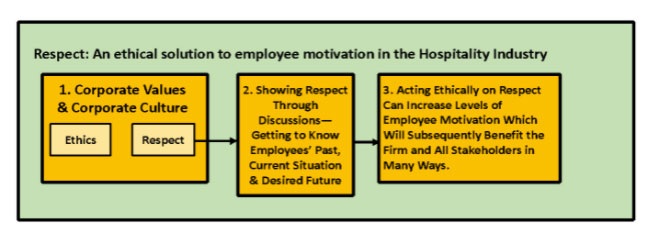Respect: an Ethical Solution to Employee Motivation in the Hospitality Industry

Our primary job as hospitality managers is to motivate employees to perform certain tasks in a manner that produces certain desired outcomes. Historically, in a time when people went to work for a firm and sometimes remained there for the majority of their career, motivation was easier because there was a significantly greater level of pride and a stronger work ethic amongst employees than currently exists. These tendencies of long tenure and strong work ethic were primarily based both on the cultural and normative values of the time—that is what people did—what was expected of them and on the significantly less competitive environment that existed (i.e., fewer hospitality businesses to work at).
Obviously, things have changed. A significant percentage of current-day employees view our industry as way to earn money and get work experience while they are in high school, college, or simply trying to figure out what they want to do with their lives. The current average tenure of hospitality employees in the U.S. is about one year. These changes have been exacerbated by the COVID 19 virus—some career-oriented employees are taking a more long-term view of their careers by trying to find work that they view as more stable and because some potential applicants are hesitant to work in the hospitality industry, managers are finding that the power over determining wages, benefits and incentives has begun shifting from owners and managers to employees. These and various other challenges, such as some, but not all industry managers being viewed as not caring about employees or their future, has resulted in hospitality firms having significant challenges staffing their businesses.
The question becomes, “How do we motivate employees to view their jobs as having career potential and therefore to take their job-related responsibilities more seriously?” Regarding the career potential in our industry, there are three major influencing factors—political regulations, disruptive changes in our industry, and the competitive nature of individual businesses. We have very little control over political regulations (e.g., taxes, deregulation, wars, response to viruses/pandemics, etc.) and disruptive changes (third-party food delivery, home-sharing, etc.), but fortunately we have a considerable degree of control over the third factor, the competitive nature of individual businesses. The key question of course is, “What is the best way to effectively motivate employees to remain with our businesses for longer than the one-year average and to do their absolute best to help our company achieve its goals?” There are many opinions on this topic, but based on 50+ years of both hands-on experience in the industry (cook through VP of operations, consulting, expert witness, etc.) and theoretical experience through teaching human resource management and marketing courses and researching related information for many books and articles, the following is my opinion. The solution is to simply increase our attention on helping each employee to achieve their potential through the ethical application of respect. This can be accomplished through a sequential process as seen in the model in the figure below. Since this is not an 8,000-word academic article and the vast majority of the process is highly intuitive, especially for hospitality industry professionals, I will provide a brief overview of the components of the model.
- Corporate Values and Culture. Strong, positive corporate values ideally lead to a strong positive corporate culture. Ethics, the concept of doing what is right and moral, is generally considered the most important corporate value because it impacts virtually all other values. The value that I believe has the greatest impact on the situation being described here is respect—in this case, the ethical regard for the feelings, rights, and personal goals of the employee.
- Showing Respect for Employees. One of the most impactful ways of showing employees that we respect them is getting to know them by spending time talking with them. The key would be to learn about their career goals or if they have any. Then based on this knowledge, if they do not have career goals, help guide them in setting some; if they have them, help them to achieve their goals; and if appropriate, help with other life circumstances. Simply talking with them about their future can go a long way in improving their level of motivation—and their mutual respect for you. Providing them with support beyond this, such as providing advancement opportunities to worthy employees can have an even greater impact.
- Benefits of Showing Respect. Ideally, the results of doing this will include an increase in the level of motivation of employees, higher levels of employee satisfaction, lower employee turnover and subsequently, increases in most key performance indicators—KPIs, such as, customer satisfaction, management satisfaction, brand image, sales, profit, etc.
Luckily, the solution to many of life’s challenges is to simply and ethically treat everyone with respect. The results are amazingly satisfying and productive. As one saying goes, employees don’t care how much you know, until they know how much you care.

